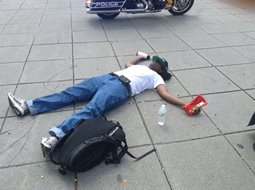“Brick City,” as Newark, New Jersey is known, has always been a hotbed of political activity and community advocacy. The city has a special place in history as one of the first major U.S. cities to elect a Black mayor, the site of the 1967 Black Power Conference that framed the civil rights tension of that era, and a city engulfed in a riot, or as locals prefer, a rebellion, that reflected the turmoil of the time in our nation’s cities and the growing economic dislocation and political oppression of African-Americans.
On Sunday the People’s Organization for Progress (POP) issued a call for residents of Newark to express their outrage to the verdict in the George Zimmerman trial, and they responded in mass. Heeding the direction of longtime POP chairman and Newark activist Larry Hamm, a crowd estimated at beyond 1,000 braved a hot New Jersey summer afternoon and converged on the city’s downtown. Hamm, with megaphone in hand, assembled the large gathering at the heart of the city’s retail corridor, Broad and Market streets. Those assembled represented not just POP but included other organizations as well as local elected officials, faith leaders and community activists. Among individuals spotted in the throng were Newark Councilwoman Mildred Crump, Councilman and mayoral candidate Ras Baraka, and the mayor of neighboring Irvington, Mayor Wayne Smith.
 The marchers also included a very large contingent of young people, of all ages; perhaps recognition of the stakes the Zimmerman verdict represent for Black youth. One young man laid prone in the middle of the intersection of Broad and Market streets, with skittles candy in one hand and an ice tea in the other, representing Trayvon Martin on the night he was killed by George Zimmerman. It was an effective and symbolic reenactment of the non-threatening posture of Martin before he was assaulted by Zimmerman. There were children carrying signs and others marching in tow with their parents. The number of young Black men in the crowd was significant and signals that the level of outrage has penetrated the group most impacted by the events in Sanford, Florida.
The marchers also included a very large contingent of young people, of all ages; perhaps recognition of the stakes the Zimmerman verdict represent for Black youth. One young man laid prone in the middle of the intersection of Broad and Market streets, with skittles candy in one hand and an ice tea in the other, representing Trayvon Martin on the night he was killed by George Zimmerman. It was an effective and symbolic reenactment of the non-threatening posture of Martin before he was assaulted by Zimmerman. There were children carrying signs and others marching in tow with their parents. The number of young Black men in the crowd was significant and signals that the level of outrage has penetrated the group most impacted by the events in Sanford, Florida.
The march was actually two protests in one. As Larry Hamm got marchers ready to move along Broad Street another large group formed a circle and blocked the intersection of Broad and Market streets. It was a well-orchestrated demonstration that received honks from the horns of drivers in cars held up by the protest and pulled people who were milling on the sidewalks. In the center of the circle was Black literary icon and Newark activist Amiri Baraka, father of the mayoral candidate, encouraging the crowd to be persistent in its advocacy for justice. As Hamm began to lead the marchers down Broad Street the circle opened up to create a passageway and then continued to block the intersection.
Hamm looped the march and on its way back down Broad Street the group stopped in front of the world headquarters of Prudential Financial Inc. A holdover from the 1967 unrest, Prudential is the largest corporate presence in the city, a major influence in civic affairs with its name on the city’s performing arts center and downtown arena, and is currently working on a new office complex in the city’s downtown. Standing in front of the lobby doors the chairman of POP urged marchers to call the White House and demand federal charges against George Zimmerman. Hamm also told the assembled crowd that one day of protest was not sufficient and asked them to return for a Monday afternoon repeat. POP has already shown its consistency with a year-long protest in downtown Newark to protest the nation’s housing crisis and economic deprivation of the poor and people of color. Under the leadership of Hamm the organization has been a constant force in the city, ever present and taking on issues that other organizations do not have the history or breadth to take on. Yesterday’s demonstration marked the latest effort by the People’s Organization for Progress to call attention to the nation’s injustices.

today in black history
April 26, 2024
South Africa held its first all-race election in 1996, with almost 23 million voters casting ballots over four days.
Newark Hits Streets in Protest
Large numbers turn out to voice outrage
POSTED: July 15, 2013, 8:00 am





















